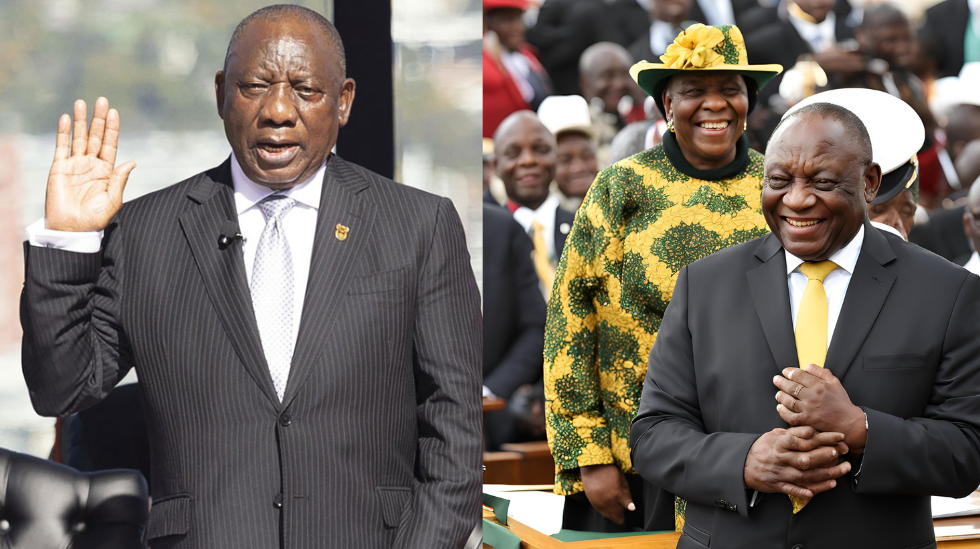In a landmark event, Cyril Ramaphosa was sworn in as South Africa’s president for a second term. His victory, however, was not achieved through the African National Congress (ANC) alone, but with substantial backing from coalition parties. This article explores the details of his inauguration, the political dynamics that led to his second term, the role of coalition parties, and the implications for South Africa’s future.

The Swearing-In Ceremony
On a bright morning in Pretoria, the Union Buildings served as the backdrop for Ramaphosa’s inauguration. The event was attended by dignitaries, local leaders, and international guests, reflecting the significance of the occasion. Ramaphosa took the oath of office administered by the Chief Justice, pledging to uphold the constitution and serve the people of South Africa.
A Symbol of Unity
The ceremony was marked by a theme of unity and renewal. In his inaugural speech, Ramaphosa emphasized the importance of working together across party lines to address the nation’s challenges. He called for a collective effort to combat corruption, improve the economy, and enhance social justice.
The Path to the Second Term
Ramaphosa’s journey to his second term was fraught with challenges. The ANC, South Africa’s ruling party since the end of apartheid, has been grappling with internal divisions and declining public support. The 2024 general elections saw the ANC failing to secure an outright majority, necessitating a coalition to form a government.
Coalition Negotiations
The post-election period was dominated by intense negotiations. The ANC, under Ramaphosa’s leadership, engaged with several smaller parties to form a viable coalition. Key partners included the Democratic Alliance (DA), the Economic Freedom Fighters (EFF), and the Inkatha Freedom Party (IFP). Each party brought unique demands and priorities to the table, making the negotiations complex and strategic.
Securing Coalition Support
Ramaphosa’s ability to secure coalition support was a testament to his political acumen and commitment to inclusive governance. He managed to bring together diverse political ideologies under a common agenda focused on national interest. The coalition agreement outlined shared goals such as economic reform, anti-corruption measures, and social development initiatives.
The Role of Coalition Parties
The coalition parties played a crucial role in Ramaphosa’s re-election. Their support was not merely symbolic but came with expectations of significant influence in the new administration.
Democratic Alliance (DA)
The DA, South Africa’s main opposition party, saw an opportunity to push for greater transparency and accountability in governance. In exchange for their support, they secured key ministerial positions and policy concessions aimed at enhancing democratic institutions and reducing corruption.
Economic Freedom Fighters (EFF)
The EFF, known for its radical economic policies, advocated for land reform and wealth redistribution. Their inclusion in the coalition brought a renewed focus on addressing economic inequalities. The EFF’s support was pivotal in appealing to a broader section of the electorate, particularly the youth and marginalized communities.
Inkatha Freedom Party (IFP)
The IFP, with its strong regional base in KwaZulu-Natal, brought regional stability and support. Their participation ensured that regional interests were represented in the national government, promoting a more balanced and inclusive approach to governance.
Implications for South Africa’s Future
Ramaphosa’s second term, backed by a coalition, holds significant implications for South Africa’s political landscape and future development.
Governance and Stability
The coalition government is expected to bring a more balanced and stable approach to governance. With diverse voices at the table, policies are likely to be more inclusive and representative of the broader population. However, maintaining cohesion among coalition partners will be a continuous challenge.
Economic Reforms
One of the key focuses of Ramaphosa’s second term is economic reform. The coalition has committed to policies aimed at stimulating growth, attracting investment, and creating jobs. Addressing structural issues in the economy, such as unemployment and inequality, will be critical to achieving these goals.
Anti-Corruption Measures
Corruption has been a major issue in South Africa, eroding public trust in the government. The coalition has prioritized anti-corruption measures, with a commitment to strengthen institutions like the judiciary and law enforcement agencies. Transparency and accountability will be key to restoring public confidence.
Social Justice and Development
The coalition government is expected to strongly emphasize social justice and development. Initiatives to improve education, healthcare, and social welfare are likely to be prioritized. Land reform and wealth redistribution, driven by the EFF, will also be key areas of focus.
Regional and International Relations
Ramaphosa’s administration will continue to play a significant role in regional and international affairs. Strengthening ties with neighboring countries and global partners will be crucial for South Africa’s economic and political interests. The coalition government’s diverse composition may also influence a more multifaceted approach to foreign policy.
Challenges Ahead
Despite the optimism surrounding Ramaphosa’s second term, several challenges lie ahead.
Maintaining Coalition Unity
Keeping the coalition partners united will require skillful negotiation and compromise. Divergent priorities and political ambitions could lead to tensions and instability within the government.
Economic Pressures
South Africa faces significant economic pressures, including high unemployment, inflation, and a struggling public sector. Implementing effective economic reforms will be critical but challenging in the current global economic climate.
Social Discontent
Addressing social discontent and delivering tangible improvements in the lives of ordinary South Africans will be essential. Failure to meet the high expectations of the electorate could lead to increased public dissatisfaction and unrest.
Cyril Ramaphosa’s second term as South Africa’s president, supported by a coalition government, marks a new chapter in the country’s political history. The coalition’s diverse composition offers a unique opportunity for more inclusive and effective governance. However, significant challenges remain, and the success of this coalition will depend on its ability to work together towards common goals. Ramaphosa’s leadership will be crucial in navigating these complexities and steering South Africa towards a more prosperous and equitable future.
